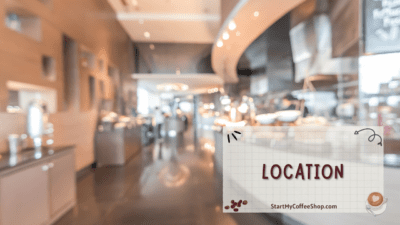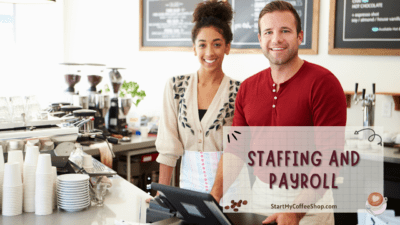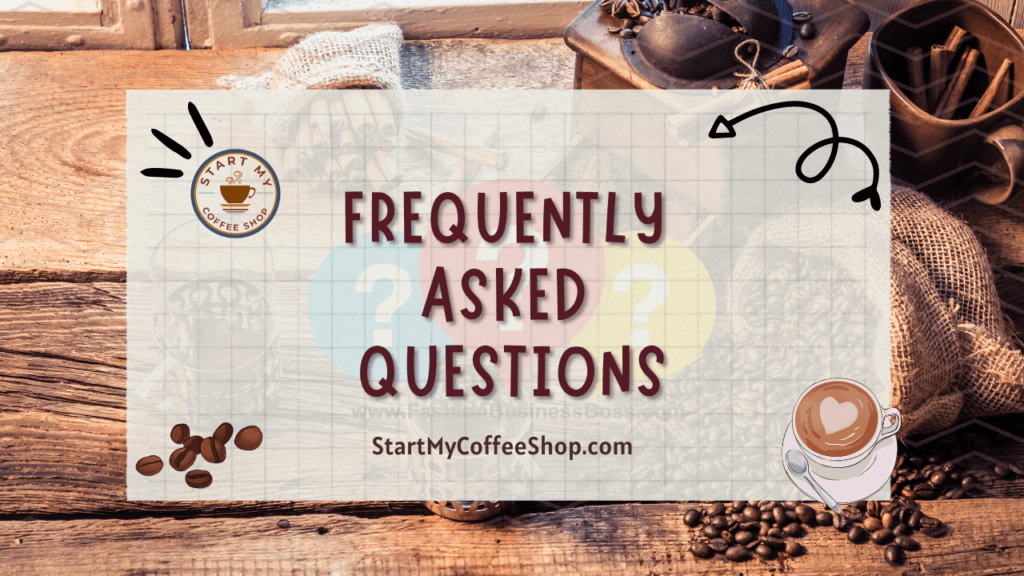Starting a coffee shop is a dream for many caffeine enthusiasts and aspiring entrepreneurs. However, it’s crucial to understand the financial landscape before diving into this aromatic venture.
The average cost to start a coffee shop typically ranges from $80,000 to $300,000, depending on various factors such as location, size, equipment, renovations, licenses, and initial inventory.
In this article, I will delve into the typical costs associated with opening a coffee shop.
I. Location
The costs associated with securing a suitable location can vary widely depending on whether you choose to lease or purchase a space. In bustling city centers or prime retail areas, lease prices tend to be high due to the high demand and foot traffic.
On the other hand, rural or less trendy neighborhoods may offer more affordable leasing options. Carefully assessing your target market and business goals will help you determine the ideal location for your coffee shop.
In addition to lease or purchase expenses, it’s important to consider renovation costs when transforming the chosen space into a coffee shop. This process may involve interior design, furniture selection, signage installation, and possibly even necessary construction work.
Renovations are essential to create an inviting atmosphere that reflects your brand and attracts customers. However, it’s crucial to allocate a budget for these costs as they can vary greatly depending on the condition of the space and the desired aesthetic. Minor cosmetic updates may require a few thousand dollars, while more extensive renovations can reach tens of thousands of dollars.

To make informed decisions about location and renovations, conducting thorough market research is crucial. Understand the demographics, competition, and customer preferences in the area you’re considering. This research will help you identify the best location that aligns with your target market and maximizes your chances of growth.
Additionally, it’s advisable to consult with real estate professionals, contractors, and designers who have experience in the food and beverage industry. Their expertise can provide valuable insights and ensure that your location and renovation costs align with your overall budget and business strategy.
Remember, choosing the right location and creating an appealing ambiance through renovations are investments that can contribute to the long-term viability and profitability of your coffee shop. By carefully considering these factors and allocating an appropriate budget, you’ll be well on your way to creating a welcoming space where customers can enjoy their favorite brews.
Read more about Starting Costs for Coffee Shop: Navigating Its Starting Costs
II. Brewing Equipment and Essentials
Equipping your coffee shop with the necessary machinery and tools is a significant cost that should be carefully considered. The essential equipment includes commercial-grade espresso machines, grinders, brewers, refrigeration units, blenders, and POS (Point of Sale) systems.
These equipment are the backbone of your coffee shop and play a crucial role in delivering high-quality beverages to your customers. However, the costs associated with acquiring them can add up quickly.
The price range for these equipment investments typically falls between $20,000 and $50,000, depending on the quality, brand, and specific features you require. High-end, top-of-the-line equipment will naturally command a higher price tag, but it may offer greater durability, performance, and reliability.
On the other hand, more affordable options can still provide decent functionality for smaller or budget-conscious coffee shops. Careful consideration should be given to your business needs and long-term goals when deciding on the equipment that best suits your establishment.
In addition to the larger machinery, you’ll also need to invest in small wares. These seemingly minor items, such as cups, mugs, saucers, spoons, filters, and other serving utensils, are essential for the daily operations of your coffee shop.
While their costs may be relatively low, they can contribute to the overall expense. It’s important to ensure you have an adequate supply of these small wares to meet customer demand while also accounting for breakage, wear and tear, and regular replacement.
To manage equipment costs effectively, it’s beneficial to research different suppliers and compare prices. Consider seeking recommendations from industry professionals or engaging with coffee shop owner communities to gain insights into reputable suppliers and cost-effective options. Additionally, it’s advisable to factor in maintenance and repair costs when budgeting for equipment to ensure smooth operations and prolong the lifespan of your investments.
III. Licenses, Permits, and Legal Requirements
Before you can open the doors of your coffee shop, it’s crucial to navigate the maze of licenses, permits, and legal requirements that come with the territory. The specific licenses and permits you’ll need can vary depending on your location and the regulations set forth by local authorities. Ensuring compliance with these legal obligations is essential for the smooth operation of your business and for avoiding potential penalties or shutdowns.
Common licenses and permits that coffee shop owners typically need to acquire include business licenses, food handling permits, health department inspections, and, in some cases, liquor licenses if you plan to serve alcoholic beverages.
Each of these requirements serves a specific purpose in maintaining public health, safety, and regulatory standards. The process of obtaining these licenses and permits may involve submitting applications, providing necessary documentation, and undergoing inspections.
To navigate this complex landscape, it’s advisable to seek professional guidance from a lawyer or consultant who specializes in the food and beverage industry. They can provide valuable insights into the specific requirements of your location and help streamline the application process. While engaging a legal professional incurs additional expenses, it is a worthwhile investment to ensure that you meet all the necessary legal obligations.
When budgeting for your coffee shop, it’s important to allocate funds specifically for these legal expenses. The costs associated with licenses, permits, and legal assistance can vary depending on factors such as the complexity of the process, the location of your business, and any additional requirements specific to your establishment. Generally, you can expect these expenses to range from a few hundred to several thousand dollars.
By proactively addressing the legal aspects of opening a coffee shop and allocating a budget for the associated expenses, you can navigate the licensing and permitting process more smoothly. This allows you to focus on the other crucial aspects of your business, such as developing your menu, hiring staff, and creating a welcoming atmosphere for your customers.
Remember, compliance with legal requirements is not only necessary for the operation of your coffee shop but also demonstrates your commitment to upholding industry standards and ensuring the safety of your customers. Investing time and resources in understanding and fulfilling these obligations will contribute to the long-term viability and reputation of your coffee shop.
IV. Staffing and Payroll

When estimating costs, it’s essential to factor in employee wages, payroll taxes, and potential benefits to ensure fair compensation and compliance with labor laws. The number of staff members you’ll need will depend on the size of your coffee shop, the volume of customers you anticipate, and the range of services you offer.
Employee wages are a significant consideration in your budgeting process. The specific wage rates will depend on factors such as local labor market conditions, minimum wage requirements, and the skill level of your staff. It’s important to research the prevailing wages in your area and set competitive rates to attract and retain qualified employees.
In addition to wages, you must also account for payroll taxes, which include contributions for social security, Medicare, and unemployment insurance. These taxes are calculated based on the wages you pay to your employees and vary depending on the applicable rates determined by government authorities.
Benefits such as health insurance, retirement plans, and paid time off are also essential considerations. While these additional perks may incur additional costs, they can contribute to higher employee satisfaction, loyalty, and overall productivity. Offering benefits can be a way to attract and retain talented staff members in a competitive job market.
It’s worth mentioning that training costs may arise if you hire staff members with limited experience or wish to implement specialized training programs to ensure consistent quality and customer service. While training expenses may require an initial investment, they can result in a highly skilled team that provides exceptional service, leading to increased customer satisfaction and loyalty.
To manage labor costs effectively, it’s important to balance providing fair compensation to your employees and ensuring that your business remains financially viable. Careful workforce planning, scheduling optimization, and regular performance evaluations can help you optimize labor utilization and control costs.
Read more about Start-up Costs for Sit-Down Coffee Shops: An In-Depth Look at Start-Up Costs
V. Initial Inventory and Supplies
When setting up your coffee shop, one crucial aspect to consider is stocking the initial inventory and supplies. This encompasses a wide range of items, including coffee beans, tea, milk, syrups, sweeteners, pastries, and other consumables. The cost of these supplies will depend on the variety and quality of products you choose to offer to your customers.
To optimize your budget and ensure a reliable supply chain, it’s beneficial to establish relationships with reputable suppliers. By sourcing from trusted suppliers, you can negotiate favorable pricing and potentially secure discounts for bulk purchases. This strategic approach can help you manage costs while maintaining the quality and consistency of your offerings.
When estimating the expense of your initial inventory, it’s important to consider factors such as the anticipated sales volume, customer preferences, and seasonality. Conducting market research and analyzing customer demand can provide valuable insights to guide your purchasing decisions. Additionally, keep in mind that inventory management plays a crucial role in avoiding wastage and ensuring efficient stock rotation.
VI. Marketing and Promotion
To attract customers and build brand awareness for your coffee shop, it’s essential to allocate a budget for marketing and promotion. This encompasses various strategies and channels that can help you reach your target audience effectively.
One avenue to consider is social media advertising, which allows you to showcase your coffee shop’s offerings, engage with customers, and create a strong online presence. Additionally, traditional marketing methods such as print advertisements, radio spots, or local event sponsorships can help you reach a wider audience and generate buzz within the community.
Investing in signage is also crucial to catch the attention of passersby and communicate your brand identity. Eye-catching and well-designed signage can make a significant impact in attracting customers to your coffee shop.
Developing a user-friendly and visually appealing website is another important marketing investment. A well-designed website can provide information about your coffee shop, highlight your menu, and even allow customers to place online orders or make reservations.
Collaborating with local businesses or participating in community events can also be effective marketing strategies. Partnering with nearby establishments for cross-promotion or sponsoring local events can help increase your visibility and attract customers who might not have discovered your coffee shop otherwise.
While the costs of marketing can vary depending on the specific channels and strategies you choose, a general guideline is to allocate around 5-10% of your overall budget to marketing efforts. This ensures that you have sufficient resources to implement various marketing activities and reach your target audience effectively.
Summary
Starting a coffee shop requires careful financial planning and consideration of various costs. The typical expenses associated with opening a coffee shop include location costs, equipment purchases, licenses and permits, staffing and payroll, initial inventory, and marketing and promotion.
By understanding these costs and conducting thorough research, you can budget effectively, secure funding, and embark on your coffee shop journey with confidence. Remember, with dedication, passion, and a well-prepared budget, you can turn your coffee shop dreams into a thriving reality.
Frequently Asked Questions

Q: Are there any ongoing expenses to consider after opening a coffee shop?
A: Yes. You should consider ongoing expenses such as rent or mortgage payments, utilities, employee wages, restocking inventory, marketing, and maintenance costs.
Q: Do I need any specific permits or licenses to open a coffee shop?
A: Yes. These can include business licenses, food handling permits, health department inspections, and potentially a liquor license if you plan to serve alcoholic beverages.
Q: How much should I budget for coffee shop equipment?
A: Budgeting for coffee shop equipment can vary, but you can expect to allocate around $20,000 to $50,000 for essential items like commercial-grade espresso machines, grinders, brewers, refrigeration units, and POS systems.
To learn more on how to start your own coffee shop checkout my startup documents here
Please note: This blog post is for educational purposes only and does not constitute legal advice. Please consult a legal expert to address your specific needs.

Hi! I’m Shawn Chun
My adventure in coffee began when I first launched my first coffee shop back in the early 2000s. I had to figure out so many things on my own and to make it worse within 2 years of opening two large corporate coffee chains moved in just blocks away from me!
As I saw smaller and even some larger coffee shops in the neighborhood slowly lose customers to these giant coffee chains and slowly close up shop, I knew that I had to start getting creative…or go out of business.
I (like you may be) knew the coffee industry well. I could make the best latte art around and the foam on my caps was the fluffiest you have ever seen. I even had the best state-of-the-art 2 group digital Nuova Simonelli machine money could buy. But I knew that these things alone would not be enough to lure customers away from the name brand established coffee shops.
Eventually, through lots of trial and error as well as perseverance and creativity I did find a way to not only survive but also thrive in the coffee/espresso industry even while those corporate coffee chains stayed put. During those years I learned to adapt and always faced new challenges. It was not always easy, however, in the end, I was the sole survivor independent coffee shop within a 10-mile radius of my location. Just two corporate coffee chains and I were left after that year. All told the corporate coffee chains took down over 15 small independent coffee shops and kiosks and I was the last one standing and thriving.
Along the years I meet others with the same passion for coffee and I quickly learned that it is not only “how good a barista is” that makes a coffee shop successful, but the business side of coffee as well.
Hence why I started this website you are on now. To provide the tools and resources for up and coming coffee shop owners to gain that vital insight and knowledge on how to start a coffee shop successfully.
Stick around, browse through my helpful blog and resources and enjoy your stay! With lots of LATTE LOVE!
Shawn







